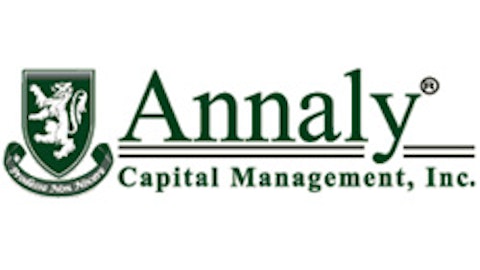In recent years, REITs have gained tremendous favor as stable investments that produce high but predictable yields. Many REITs distribute at least 10 percent of their total NPV on an annual basis, and many have yields that exceed 15 percent. In exchange, REITs generally trade within narrow ranges and rarely participate in equity-market rallies without catalysts specific to the real estate market.
Three firms have caught the attention of observers who play in the REIT space: American Capital Agency Corp. (NASDAQ:AGNC), New York Mortgage Trust, Inc. (NASDAQ:NYMT), and Invesco Mortgage Capital Inc (NYSE:IVR). All three of these companies focus heavily on mortgage-backed securities and eschew physical home purchases. Although this business model lends some stability to their operations, these REITs are vulnerable to sudden changes in the money supply or periods of volatility within the mortgage industry. Investors who wish to gain exposure to the improving housing market and explore potential hedging options for traditional equity positions would do well to take a closer look at these three names.
Comparing American Capital Agency, New York Mortgage Trust and Invesco Mortgage Capital
Since they are structured as REITs, the balance sheets and earnings reports of these three names look starkly different from those of “traditional” companies. With a market capitalization of nearly $10 billion, American Capital Agency Corp. (NASDAQ:AGNC) is by far the largest of the three. New York Mortgage Trust, Inc. (NASDAQ:NYMT) has a valuation of just over $400 million, and Invesco Mortgage Capital Inc (NYSE:IVR) comes in with a capitalization of just under $2.5 billion. Profit margins at all three firms are quite high: Although Invesco Mortgage Capital Inc (NYSE:IVR)’s 89 percent buffer tops the list, New York Mortgage Trust, Inc. (NASDAQ:NYMT) and American Capital Agency Corp. (NASDAQ:AGNC) also post strong respective figures of about 73 percent and 80 percent. Like most mortgage-focused REITs, these names are all highly leveraged. American Capital Agency Corp. (NASDAQ:AGNC) has long-term debt of about $80 billion to offset a cash hoard of $15 billion. Invesco Mortgage Capital Inc (NYSE:IVR) reports total debts of $19 billion and a rather paltry cash reserve of just $280 million. Even the much-smaller New York Mortgage Trust, Inc. (NASDAQ:NYMT) maintains a debt sheet of $6.5 billion and cash reserves of about $254 million.
Common Holdings
All three of these firms maintain portfolios of mortgage-backed securities. It is crucial to note that these portfolios are not uniform. For instance, New York Mortgage Trust, Inc. (NASDAQ:NYMT)’s holdings consist of securities derived from single-family mortgages as well as multi-unit residential, adjustable-rate, interest-only, distressed-market and commercial loans. The other two names are similarly diversified. This serves to insulate these REITs from risks specific to certain sub-sectors of the mortgage industry.
Distribution Ratios
All three of these firms enjoy double-digit payouts. At last count, American Capital Agency Corp. (NASDAQ:AGNC) led the pack with a yield of 18 percent. New York Mortgage Trust, Inc. (NASDAQ:NYMT) was close behind with a payout figure of 15.6 percent, and Invesco Mortgage Capital Inc (NYSE:IVR) offered a solid yield of about 13.4 percent. Under normal circumstances, such yields would be dangerously high. However, these firms are structured to distribute the bulk of their earnings to their shareholders and have the wherewithal to maintain their hefty payouts.
Are They Sustainable?
Many investors and analysts are convinced that high-yield vehicles like these three REITs represent essential hedging tools for everyday investors. Since retail investors and small-time day-traders are not equipped to buy and sell large tranches of mortgage-backed securities and other credit-default swaps on a regular basis, these REITs provide access to those instruments while mitigating the obvious risks associated with them.




